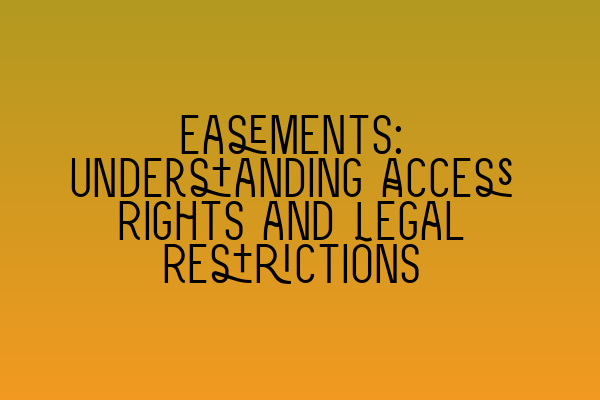Easements: Understanding Access Rights and Legal Restrictions
Welcome to SQE Property Law & Land Law, where we are dedicated to providing you with expert legal advice and guidance on various property law topics. In this blog post, we will delve into the intriguing world of easements, focusing on understanding access rights and legal restrictions.
For those new to the concept, an easement is a legal right which allows someone to use a specific part of another person’s property for a particular purpose. It grants the holder of the easement certain rights over the property, even though they are not the owner. Easements can be created in various ways, such as by necessity, prescription, or through a formal agreement between the parties involved.
Access rights, as the name suggests, pertain to the ability to access a particular property. They can be of vital importance, especially in scenarios where a property is surrounded by other land or is lacking direct access to a public road. Access rights ensure that property owners can enter and exit their property freely, without being unduly burdened by restrictions imposed by neighboring properties.
On the other hand, legal restrictions refer to limitations placed on the use of a property, either by the law itself or through specific agreements between parties. These restrictions can cover a wide range of issues, including noise limitations, height restrictions, zoning restrictions, and more. It is crucial to be aware of these legal restrictions to avoid potential conflicts and legal consequences down the line.
Now that we have an overview, let’s explore some key points related to easements, access rights, and legal restrictions:
1. Types of Easements:
– Easements of way: These occur when someone is granted the right to pass through another person’s property.
– Easements of support: These involve the right to have a neighbor’s land provide support to one’s property.
– Easements of light and air: These allow property owners to ensure they have a continued source of natural light and air.
– Easements of drainage: These grant the right to use another property’s drainage system.
2. Creation of Easements:
– Express grants: Easements can be created through a written agreement between the parties involved.
– Prescription: Easements can be acquired through long-term and continuous use of another person’s property without interruption.
– Necessity: Easements can be created when there is no other reasonable way to access a property.
3. Access Rights and the Right to Enjoy Property:
– The right to access is essential for property owners to fully utilize and enjoy their property.
– Lack of proper access can significantly impact property value and make it challenging to carry out everyday activities.
4. Understanding Legal Restrictions:
– Legal restrictions can be imposed by local authorities to maintain order and protect the interests of the community.
– Zoning restrictions ensure an appropriate use of land and prevent incompatible activities in specific areas.
– Height and noise restrictions may be implemented to preserve the quality of life for neighboring properties.
Knowing your rights and obligations related to easements, access rights, and legal restrictions is vital for property owners and prospective buyers. It is recommended to consult with a professional property law solicitor who can provide expert advice tailored to your specific circumstances. By seeking professional guidance, you can ensure that you are fully informed and protected within the confines of the law.
If you found this article helpful, be sure to check out our related articles on SQE 1 Practice Exam Questions, SQE 1 Practice Mocks FLK1 FLK2, SQE 2 Preparation Courses, SQE 1 Preparation Courses, and SRA SQE Exam Dates for further information on the SQE exams, preparation, and essential dates to keep in mind.
For any property law inquiries or legal assistance, do not hesitate to contact SQE Property Law & Land Law. Our team of experienced solicitors is here to assist you every step of the way.
Disclaimer: This article is for informational purposes only and does not constitute legal advice. It is always recommended to seek professional guidance from a qualified solicitor regarding your specific situation.
[End of the blog post]
